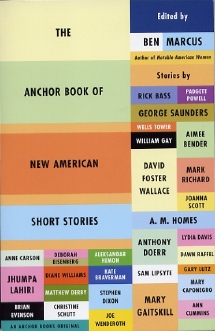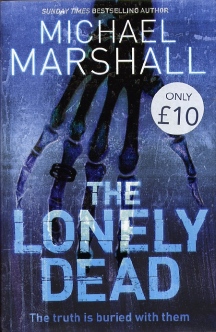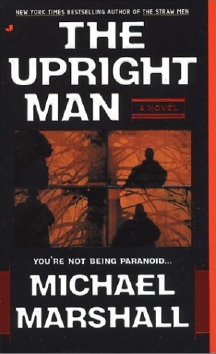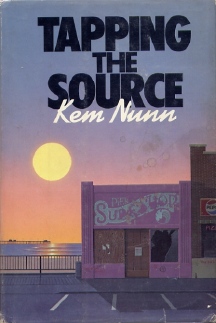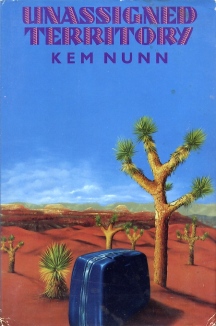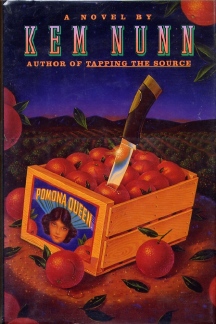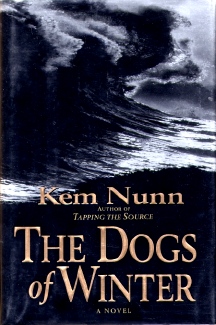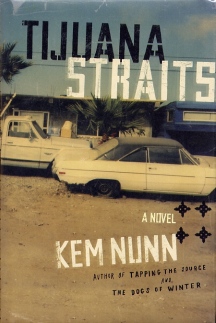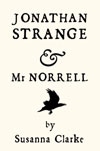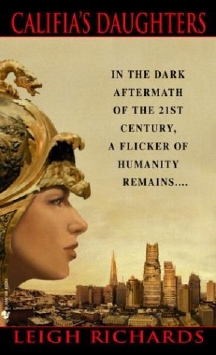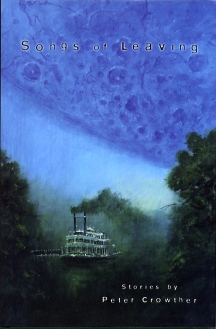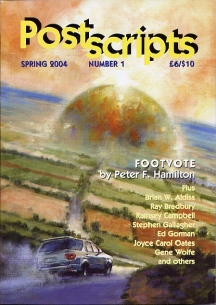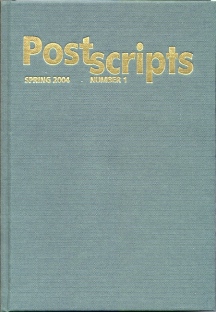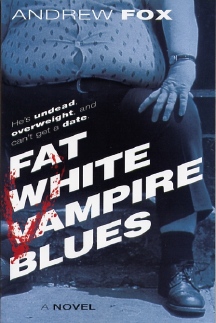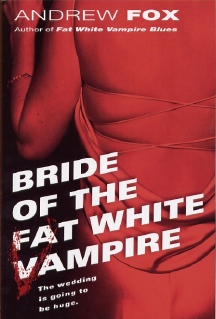|
|
|
This Just in..News from the Agony Column
|
08-20-04: Twenty-Nine Ways to Transform |
||||||
The
Anchor Book of New American Short Stories Edited by Ben Marcus
Look, I read a lot more genre fiction than the average consumer of literary fiction. Those selections are mostly novels. What Ben Marcus has done is find all the literary authors that I've been intrigued by -- and many I'm certainly now intrigued by -- found their best short stories and put them in an attractively designed and reasonably priced anthology. Even as I read that description, I realize that it's misleading. That's because Marcus is something of a devil. His idea of literary coincides a lot more with my idea of literary than I might ever have imagined. This collection is going to shock as many readers of "literature" as it is readers of genre fiction. If you think literature isn't capable of being really, really, really weird, you might not be ready for 'The Anchor Book of New American Short Stories'. And that's precisely why you need to run, not walk and buy then read this collection. That said, not everything is weird, weird, weird, though everything I tested with my patented psychic reading ability was good, good, good. So, for example, A. M. Homes short story "Do Not Disturb", is pretty much in the literary pocket. You've probably read about A. M .Homes, and you're more likely to have done so if you've been in the vicinity of McSweeney's. She's got the requisite "acclaimed novels" and "literary reputation". But there's a sense of dislocation in this story that's really unsettling, giving almost the feel of science fiction, of a Philip K. Dick story beamed in from another universe where Philip K. Dick Is Alive, and Someone Else is Dead. Plus, it's funny. I think that "something new" might very well be this collection of stories. Readers will find themselves making notes left and right, up and down, running searches for information on the authors of the stories. How can you not love a collection of stories that includes Joe Wenderoth's "Letters to Wendy's"? When the best thing, the only thing you can say about a story (as in this case) is "Read it," then you know you've reached some kid of plateau, probably the Eldritch Plateau of Leng first discovered in stories by H. P. Lovecraft. Demon-haunted, unreal, subject to dimensional shifts.
Marcus has, as it happens, three books out and damn if you won't want to buy them all. 'Notable American Women' is apparently something of a handbook for life within a very bizarre cult that calls itself 'The Silentists', who employ "emotional removal booths" to make life glad. You get lists of what to eat and how to act that pixilate into a very odd plot. His second novel is 'The Father Costume', a collaboration with artist Matthew Ritchie. From what I can suss, it may be even weirder than 'Notable American Women'. I'll be following my own advice and ordering up these books posthaste, and you'll be hearing a lot more about Marcus in times to come. But you clearly need to order 'The Anchor Book of New American Short Stories' to get your feet wet with words, to feel them slither between your toes, watch them crawl up your legs and burrow into your flesh in horror. Or wonder. Or Joy. Or something, anything. You're meant to feel them. No matter what emotions they evoke, you've been changed. Sorry, no going back now. |
|
08-19-04: The Lonely Dead or The Upright Man? |
|||||||
Michael
Marshall (Smith) Returns to His Killing Spree
As for the name truncation, that was done in the UK as well, and they're still doing so in the sequel. And while the author names are in sync, the titles aren't this time around; thus, the HarperCollins UK hardcover is 'The Lonely Dead' (Oh it sounds so English, doesn’t it?), while the US title hits you right between the eyes with the name of the serial killer from 'The Straw Men', 'The Upright Man'. The UK hardcover is still bargain priced, and even after shipping overseas you can get it for in the ballpark of what you'd pay for a US hardcover. But we really care about what's inside, don’t we? It took me a while to get used to the first-to-third person transitions in the last novel, and they're back. I'm going to declare myself officially over it, though that may change when I actually read the novel. But from what I can see, once again Zandt, Nina and Ward Hopkins are on the trail of a cabal of serial killers linked by a well-wrought conspiracy that reaches, as they say, to the highest levels. There's likely much more to be told than we found out in the last novel and it's likely lives will be lost in the process. Smith is easily one of our best smirky prose writers, up there in a league with Gaiman. What remains to be seen is how well he integrates his under-played humor with the very dark path he's headed down in these novels. Smith is also an excellent writer of prose to inspire toe-tapping terror, in the moody, broody British style that to me seems just as effective than the clarity-first trope that dominates American fiction. He integrates these two best in his first-person passages. I guess I just like hearing from Ward Hopkins and would be happy to listen to him and only him. It's nice to have two versions of the novel, one to read at home in the easy chair and one I can cram in my pocket. To be honest, I'd like to see another science fiction novel from Smith, full of his wild imagination and told in his smirky prose. But if none are to be had, then I'll snap this up and enjoy the hell out of it, confident that if things don't seem bad enough now, Smith will easily draw out the darkness and convince me that, bad as things seem, we don't know the half of it. |
|
08-18-04: Kem Nunn's Tijuana Straits |
|||||||||||||||||
Tapping
the Source of the Power of Prose
But there's more to Nunn than a simple Surf Noir. From his very first novel, he showed a willingness to include the absurd as well as the absolute, to include the uncanny in with the unwanted. 'Tapping the Source' starts in the desert, when Ike Tucker, working at a bicycle shop, gets bad news about his sister, gone some two years. A stranger in a white Camaro shows up and tells him that Ellen went with some guys to Mexico. They came back to Huntington Beach; she didn’t. Ike gets the names of the guys who took her to Mexico, then heads out to Huntington to find her. His journey is funny, gritty and yet luminous, filled with the deep tones and vast distances found on a lonely California beach. And while Surf Noir doesn't capture all of his writing it surely gives a good idea as to what he's about. Nunn writes with the dark pointed style of Flannery O'Connor, however, and effectively mixes some humor and irony into his poignant tale. Moreover, he's not afraid of the darkness within humans. His little surfer girls are not simple, beautiful icons. They are lost lambs tied to the stake to attract something large, dark, and hungry. 'Tapping the Source' ultimately manages to be a rather unique novel. It picks up bits of genre fiction here and there -- literary descriptions, cruel but clear characters, a clutch of clues that lead from one unpleasant discovery to another, emotional moments, and dark horrific shadows -- but none take over or direct the story. Ike is the story, he's the center, he's the guy you once knew who moved on and never came back. And when you saw him later, somewhere else, there's something in the eyes; dangerous, maybe, unstable. You no longer want to talk to him; you're no longer willing to talk to what was once a boy but is now so clearly a troubled man.
Five years passed between the publication of 'Unassigned Territory' and 'Pomona Queen'. It eschews the extravagances of 'Unassigned Territory' for a bleak, focused San Bernardino noir. The plot is deceptively simple. Earl Dean, a traveling salesman whose route takes him through Pomona happens on Dan Brown, a dusted psychopath who's seeking revenge for the death of his brother. Nunn unravels this long night of the noir soul with panache and a stripped-down-hot-rod-without-seatbelts economy. You've met these people that Ear Dean finds himself in the midst of, and you're glad you got away. And you just barely got away. Packed with tension, humor, terror and characters so real you'll hope it's not them knocking at your door, 'Pomona Queen' puts the pedal to the metal and realizes that in doing so you can get a nasty knife very, very sharp. Five long years pass, but when Nunn returned he brought readers his best novel yet. 'The Dogs of Winter' is a passionate, poignant and troubled vision of lonely surfer, the perfect, hidden spot and the troubles that come when you ask too many questions. 'The Dogs of Winter' offers Nunn's most powerful prose experience; lyrical, liquid, scary and serene. The buzzards are circling, the lifeline's been cut. Readers who want to find themselves on that board, smashed between the sea and the sky, the blood of strangers drifting about their unraveling lives, need only pull up chair and tuck in to Nunn's gorgeously dark novel. Remember; don't ask question if you don’t want answers.
Nunn is out on a west coast tour to support his newest novel, and you can find a list of his coming appearances here. You can also probably query one of these bookstores to snag a signed copy if you can't make it to meet him. A Kem Nunn novel is a rare event, something that shouldn't be taken lightly. And if you've never read Nunn -- alas with a publication schedule like that he's not as well known as he deserves to be -- now is an excellent time to line up his work and surf through his excellent oeuvre. Running throughout Nunn's work is a wonderfully dark sensibility of the sleaziest, the worst parts of our country, the greasy alleys behind the bad liquor stores in the bad parts of town, the dusty, filthy parking lots filled with rusting wrecks, the run down neighborhoods where the weeds rule every front yard and every lawn is a potential driveway. He manages to take the reader into this dark, ugly world and evokes a sort of sullen beauty with his stark prose. His characters, fractured, fractious, uncertain of themselves yet filled with a sort of lonely pride weave their ways drunkenly through this dark landscape. And yet, in spite of all the ugliness, there's a gleam of the absurd, the humorous, an inability to take all this tragedy as seriously as one might that keeps Nunn eminently readable. And then there's the prose. Yes, the prose. Nunn's books have a handcrafted feel, the feel of fiction written in longhand on long afternoons, as a glass of lemon-laced iced tea sweats on the arm of a chair on an enclosed porch. You can hear the flies buzzing outside, and feel the deep cool shadows soothing, hiding the ugliness that surrounds you. If you squint just right, life looks tolerable. |
|
08-17-04:Late Breaking News: More Strange!, Birds Without Wings; Califia's Daughters by "Leigh Richards" |
||||||
80,
wait 79, no, wait make that 78 copies of Jonathan Strange and Mr. Norrell
Limited Edition
As ever, readers (like myself) who might prefer a UK edition and prefer to have it signed will be able to get one at Cold Tonnage. If you just want a signed US edition you should try to get to one of the signing events next month. In the meantime, I'm keeping my ear to the ground for more news on this release. If I get anything I'll put up an article as soon as I hear. I'm going to contact the US people today, so expect to hear more on this anticipated release before the week is out. |
||||||
Louis
de Bernières Follows up Corelli's Mandolin
Readers of SF&F are all-too-familiar with world building. When SF&F readers think o f world-building, they think of Tolkien's Middle Earth, Pratchett's DiscWorld or Frank Herbert's' 'Dune'. Novels that feature world-building in the foreground typically integrate epic storylines into the history of a world, taking the characters across a single arc to encapsulate a wide slice of life and a panoramic world-view. But that's not always the case. Pratchett has been writing about Discworld one small story at a time. The sum of all those parts is much, much greater than the whole. As a reader, the appeal of fiction that includes world-building as a primary component of the text is the ability to lose one's self in the narrative, to immerse one's self in another world that replaces and often reflects this one in a fractured mirror. The sheer depth of detail, the gulf that separates our world from another enable readers to travel back and forth between the two without all the inconveniences of actually going somewhere. Historical novels also engage in world-building, and may appeal to the same crowd that enjoys a good fantasy novel. For me, Caleb Carr's 'The Alienist' was such a novel. Carr created a dank, grungy vision of New York akin to the Tim Power's imagined underground London in 'The Anubis Gates'. Louis de Bernières new novel 'Birds Without Wings' (Knopf/Random House, $25.95, August 17, 2004) fits into this space rather nicely, from conception onward. On holiday in Turkey, he came across a small deserted town. It had clearly once been a thriving town with a mixed ethnic and religious population of Greek-speaking Muslims, Turkish-speaking Christians and every permutation possible. But when the modern borders of Turkey were drawn at the close of World War I, people were ripped from their homes and moved away based on religious affiliations. We're still living in the aftermath of this senseless bit of nation-making today.
Readers of fantasy novels may just want to eat this one up, even if it does take place in a world without elves and magic. You do get the required-by-fantasy map printed on the endpapers of the inner cover. It's rather lovely and probably quite helpful in sorting out what goes where. Most importantly, though, what this novel looks to have on offer is a world built whole-cloth out of words, out of the writer's passion for people and place. There's a new world waiting for us built from the old world. |
||||||
Laurie
R. King Takes On a New Name and a New Genre
She promised a new novel that was science fiction, and well, she hasn’t delivered it, but her science fiction alter-ego, Leigh Richards has. Readers can now pick up 'Califia's Daughters' (Bantam/Spectra, $6.99, August 3, 2004) and probably find a signed copy or an imminent signing at a local independent bookstore. Set in the aftermath of bio-tech tragedies that wipe out much of humanity and leave males unlikely to survive to reproductive adulthood, King treads deftly in the footsteps of both Sherri S. Tepper ('The Gate to Women's Country') and Margaret Atwood ('The Handmaiden's Daughter', 'Oryx and Crake'). In fact, her website tells us, the latter played a part in inspiring this novel. "'The Handmaid’s Tale' made me very, very angry. Here was a book dubbed “feminist” that told the story of an entire generation of gutless females, who permitted themselves to be stripped of their rights, their dignity, and even their bank accounts, when all the time they controlled the world’s most precious and threatened resource, fertility. If it had been written by a man, it would have been scorned and reviled. "'Califia’s Daughters' started out as a refutation of the ideas Atwood’s book contained. Of course, in the way of novels, it took itself off into different directions, but it is still an exploration of women and authority. It is feminist in the sense that the women in it can be every bit as bone-headed and brutal as men. It is feminist in that it posits the theory that, if women were handed the world and told to run it, they would somehow manage." Even as I type, Serena Trowbridge is reading the novel and preparing her review. King's work is always well-written and focused on the moment, on the characters, on the story. The question in most genre readers' minds is whether or not King has done her homework with regards to the science fiction genre. Given that she originally thought she'd write primarily science fiction, there's a solid reason to hope that this will be much more than the usual literary vacation in genre fiction. This is even more apparent reading the words on her website, and there's a lot more than I quoted. King is a lively, engaging writer, and we expect nothing less than a lively, engaging and enraged novel of post-apocalyptic polemics. |
|
08-16-04: Peter Crowther Wearing His Writer Hat, Peter Crowther Wearing His Editor Hat, Bride of Fat the White Vampire by Andrew Fox |
|||||||||
'Songs of Leaving' from Subterranean Press
Crowther's newest work is 'Songs of Leaving' from Subterranean Press. It's a collection of short stories of which the author says, "I'm particularly pleased with this one because it's pretty much all what you might call SF..." So how does Crowther do SF? With the same warm and human touch he brings to all his fiction. Readers who are enthused that Alan Moore's 'Watchmen' is supposedly going to be filmed by none other than Darren Aronofsky might want to take a look at Crowther's story "Heroes and Villains". Crowther approaches the subject of super-villains in an unusual but typical-for-Crowther fashion. He humanizes The Comedian, having him visit his ailing mother in hospital. Crowther was taking care his own ailing mother as he wrote the piece, and it shows in a passionate commitment to the story, to the emotions. But it's also pretty damn funny. Crowther dedicates the opening story of the collection, "Some Burial Place, Vast and Dry" to Ray Bradbury, while he begins and ends the story with quotes from Walt Whitman. If you're sensing that Crowther is perhaps a bit more interested in the literary and human aspect of his science fiction, you'd be correct. But he's vastly deeply knowledgeable of the field itself. It's an ideal combination to provide a reading experience that is highly imaginative and emotional. Crowther, a consummate professional, does not publish himself. Though 'Songs of Leaving' sports a cover by PS Publishing favorite Edward Miller (Les Edwards), the publisher is Subterranean Press. That gives him one entry for each of the two major US independent publishing houses. 'Darkness Darkness: Forever Twilight Book One' was published by Cemetery Dance almost two years ago. And while I hate to pester this obviously over-achieving publisher/editor/writer, I hope it won't be too long until the second volume of this series, 'Windows of the Soul: Forever Twilight Book Two' will be released. It's scheduled for this year and available as a pre-order from CD's website. |
|||||||||
Postscripts 1 From PS Publishing
Once you're on the inside, you'll find a selection of fiction, non-fiction, poetry and exactly one tasteful advertisement for Earthling Books, which, given the context, hardly seems like an advertisement at all, more like a recommended reading list. Fiction includes a long list of ultra-luminaries. The cover story is by Peter F. Hamilton. You get new work by Adam Roberts, Ramsey Campbell, James Lovegrove, Stephen Gallagher and Eric Brown. To a certain extent, you might expect these writers to appear; they've all published with PS before, but that just makes them extra-welcome.
I was a bit worried that this magazine might be able to ignore new writers, because well, famous types would be lining up and on tap to be in it. So I was heartened to see work by two writers unfamiliar to me, Allen Ashley and Lawrence Gordon Clark. And while these writers are unfamiliar to me, they are not entirely new to the genre; both have substantial work, though I knew nothing about them. I do now, and I'm happier for the knowledge. Though Crowther doesn't publish his own work as a writer, he's not afraid to speak up as the editor and publisher of PostScripts. He offers a nice, pithy introduction to each story, letting readers know where the writers have been and where they’re going.
I'm sorry to mention that if you like you can up the ante. It's not cheap, but if you buy the hardcover version of Postscripts magazine, they toss in the paperback copy as well. The hardcover copy gets you, well -- hardcovers, and amazingly, signature sheets. Imagine this; Bradbury, Wolfe, Oates, Lake, Gorman and Blaylock on one page. (The one they sent round the US, presumably.) The cover is issued sans DJ, and the binding is essentially the magazine itself pasted into the hardcovers nicely enough so that it’s actually easier to read. While your mileage may vary on worthiness of the hardcover (look, with a signature sheet like that, nobody's worthy), but there can be no doubt that PostScripts offers another reason to just call up Crowther, give him your CC information and tell him to send you everything he does.
|
|||||||||
Bride of Fat the White Vampire by Andrew Fox
But not too long afterwards, no less a luminary than Robert Morrish of 'Cemetery Dance' told me that this was a good title. So, another trip to Bookshop to page through it. And damn if I don’t find some funny white-trash humor when our hero, Jules Duchon, tries on a moo-moo with the help of his undead best buddy Doodlebug, the cross-dressing vampire. In 'Fat White Vampire Blues', Jules is told by Malice X. Young that his days of feasting on the blood of black victims are over. Young underscores this point by burning down Jules' house. And so, in a novel that nods to John Kennedy O'Toole's 'A Confederacy of Dunces', Fox staked out new ground in a tired genre.
A couple of lessons suggest themselves. One, you see a book you’re sure you won’t like, give it another look. Maybe you won't and maybe you will. I mean, there are some books you don' need to read because everyone around you has read them, like 'The Info-Dump Code'. But the unknowns deserve a second chance. The second lesson? Try reading the damn book before you judge it, Rick. Save yourself a lot of grief. |
